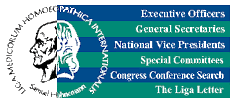Friday, January 9, 2009
Organon Of Homeopathic Medicine Par 1 - Para 3
§ 1 - Physician
The physician's high and only mission is to restore the sick to health, to cure, as it is termed. 1
1 His mission is not, however, to construct so-called systems, by interweaving empty speculations and hypotheses concerning the internal essential nature of the vital processes and the mode in which diseases originate in the interior of the organism, (whereon so many physicians have hitherto ambitiously wasted their talents and their time); nor is it to attempt to give countless explanations regarding the phenomena in diseases and their proximate cause (which must ever remain concealed), wrapped in unintelligible words and an inflated abstract mode of expression, which should sound very learned in order to astonish the ignorant - whilst sick humanity sighs in vain for aid. Of such learned reveries (to which the name of theoretic medicine is given, and for which special professorships are instituted) we have had quite enough, and it is now high time that all who call themselves physicians should at length cease to deceive suffering mankind with mere talk, and begin now, instead, for once to act, that is, really to help and to cure.
§ 2 - Higest Cure
The highest ideal of cure is rapid, gentle and permanent restoration of the health, or removal and annihilation of the disease in its whole extent, in the shortest, most reliable, and most harmless way, on easily comprehensible principles.
§ 3 - What To Cure
If the physician clearly perceives what is to be cured in diseases, that is to say, in every individual case of disease (knowledge of disease, indication), if he clearly perceives what is curative in medicines, that is to say, in each individual medicine (knowledge of medical powers), and if he knows how to adapt, according to clearly defined principles, what is curative in medicines to what he has discovered to be undoubtedly morbid in the patient, so that the recovery must ensue - to adapt it, as well in respect to the suitability of the medicine most appropriate according to its mode of action to the case before him (choice of the remedy, the medicine indicated), as also in respect to the exact mode of preparation and quantity of it required (proper dose), and the proper period for repeating the dose; - if, finally, he knows the obstacles to recovery in each case and is aware how to remove them, so that the restoration may be permanent, then he understands how to treat judiciously and rationally, and he is a true practitioner of the healing art .
The physician's high and only mission is to restore the sick to health, to cure, as it is termed. 1
1 His mission is not, however, to construct so-called systems, by interweaving empty speculations and hypotheses concerning the internal essential nature of the vital processes and the mode in which diseases originate in the interior of the organism, (whereon so many physicians have hitherto ambitiously wasted their talents and their time); nor is it to attempt to give countless explanations regarding the phenomena in diseases and their proximate cause (which must ever remain concealed), wrapped in unintelligible words and an inflated abstract mode of expression, which should sound very learned in order to astonish the ignorant - whilst sick humanity sighs in vain for aid. Of such learned reveries (to which the name of theoretic medicine is given, and for which special professorships are instituted) we have had quite enough, and it is now high time that all who call themselves physicians should at length cease to deceive suffering mankind with mere talk, and begin now, instead, for once to act, that is, really to help and to cure.
§ 2 - Higest Cure
The highest ideal of cure is rapid, gentle and permanent restoration of the health, or removal and annihilation of the disease in its whole extent, in the shortest, most reliable, and most harmless way, on easily comprehensible principles.
§ 3 - What To Cure
If the physician clearly perceives what is to be cured in diseases, that is to say, in every individual case of disease (knowledge of disease, indication), if he clearly perceives what is curative in medicines, that is to say, in each individual medicine (knowledge of medical powers), and if he knows how to adapt, according to clearly defined principles, what is curative in medicines to what he has discovered to be undoubtedly morbid in the patient, so that the recovery must ensue - to adapt it, as well in respect to the suitability of the medicine most appropriate according to its mode of action to the case before him (choice of the remedy, the medicine indicated), as also in respect to the exact mode of preparation and quantity of it required (proper dose), and the proper period for repeating the dose; - if, finally, he knows the obstacles to recovery in each case and is aware how to remove them, so that the restoration may be permanent, then he understands how to treat judiciously and rationally, and he is a true practitioner of the healing art .
Subscribe to:
Post Comments (Atom)















No comments:
Post a Comment